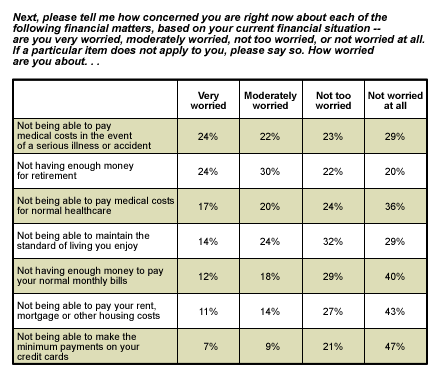On April 23, Missouri Congressman and presidential hopeful Dick Gephardt unveiled his proposed national healthcare plan. Though considered to be enormous in scope, and certainly the most sweeping of any Democratic domestic campaign plank, it actually inhabits the middle ground of healthcare reform -- somewhere between a single payer system of the kind found in Great Britain, and no reform at all. Gephardt says his plan will provide access to health insurance for all Americans, including the estimated 41 million who are currently uninsured. At an estimated initial cost of $210 billion per year, the plan would require dismissing the Bush administration's proposed tax cuts and rescinding most of those passed in 2001.
Bold as Gephardt's plan is, its political viability is questionable. But one thing seems clear: in seeking to strike an early chord with voters, Gephardt may be on the right track. Americans are worried about healthcare costs. According to a recent ║┌┴¤═° Poll, the costs of healthcare are among the biggest financial concerns Americans have.
Americans' Financial "Worry List"
The April 7-9 ║┌┴¤═° Poll* asked Americans how worried they were about seven common financial concerns, including: "not being able to pay medical costs for normal healthcare," and "not being able to pay medical costs of a serious illness/accident." Only one item, not having enough for retirement, is viewed as a significant worry by more than half of Americans. Despite a slow economy, two of the three financial concerns about which Americans are most likely to say they are very worried involve healthcare.

Bypassing Healthcare
Concerns about healthcare costs usually rank high on Americans' lists of financial worries, and the latest data are no exception. Twenty-four percent of Americans say they are very worried about paying for medical costs that result from a serious illness or accident, about equal to the number who say they're very worried about not having enough money for retirement. Another 22% are moderately worried about their ability to pay the medical costs for a serious illness or accident.
Seventeen percent of Americans say they are very worried about not being able to pay for normal healthcare costs, while 20% are moderately worried. Healthcare workers who understand the effectiveness with which preventive care reduces the likelihood of catastrophic illness may find this statistic particularly alarming. The implication is that many Americans may face enormous costs for treatment of severe illnesses that may have been preventable had they felt more able to pay for simple routine care. The fact that the United States spends more of its Gross Domestic Product on healthcare than many other industrialized nations, yet still ranks fairly low with regard to such critical measures as life expectancy and infant survival rates, suggests that more could be done in regard to preventive care in the United States.
Bottom Line
American medicine is among the best in the world. Even small community hospitals have the staff and equipment to perform what were unimaginable miracles a few years ago. But medical and technological advances have done little for those who feel they can't afford to take advantage of them. The gap is full of implications; one study released by the National Academies last year found that uninsured Americans are far more likely than those with health coverage to die prematurely of ailments such as cancer and heart disease, and that being uninsured for even a year diminishes an individual's general health.
*Results are based on telephone interviews with 1,018 national adults, aged 18 and older, conducted April 7-9, 2003. For results based on the total sample of national adults, one can say with 95% confidence that the maximum margin of sampling error is ±3%.